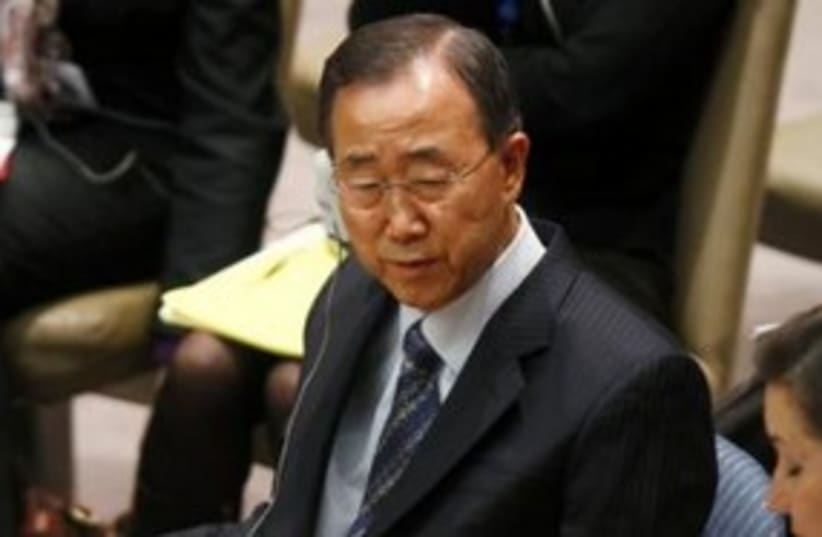RELATED:The 'doing the right thing' policy for Libya America’s Libyan intervention: Conundrums Western air strikes continue to hit Tripoli "In all my meetings, public and private, I took special care to stress that action on [Security Council resolution] 1973 is governed by the objective to save the lives of innocent civilians," Ban said in summarizing his meetings held on his recent trips to Egypt and Tunisia, as well as the Paris summit convened by French President Nicolas Sarkozy on March 19.Authorities in Egypt and Tunisia, Ban reported, are "deeply concerned" about their nationals as well as the heavy burden of caring for refugees at their borders.Up to 250,000 refugees may be displaced by the fighting in Libya, the Secretary General said."We have serious concerns about the protection of civilians and respect for human rights and international humanitarian law," Ban said at a press conference following the Security Council meeting. "Worrying signs include arrests, disappearances, threats and incitement, including by Colonel Gadhafi on national television."Ban also asserted the urgent need for humanitarian access: "More than 330,000 people have fled the country. Many of those who remain are under siege," Ban stated. "Yet Libyan authorities have not yet permitted a United Nations needs-assessment mission. I remind all parties of obligations to allow unimpeded access to populations in need."Ban emphasized the importance of the international community speaking "with one voice" both in implementing resolution 1973 and in dealing with the humanitarian situation on the ground. Representatives of both Colonel Muammar Gadhafi's Libyan government and the opposition will attend an African Union meeting in Addis Ababa, Ethiopia on Friday, aimed to reach a ceasefire. The Secretary General's special envoy will also attend the meeting, Ban said.Ban also stated that the Security Council "may take additional measures if Libyan authorities would not fully comply with the Security Council resolutions." However, he underscored that the aim of military action is to protect civilians, "not aiming to change any regime."
Ban: Libya intervention meant to protect civilians
UN secretary general briefs the Security Council on Libya saying there is no evidence that Gaddafi is complying with int'l demands.

RELATED:The 'doing the right thing' policy for Libya America’s Libyan intervention: Conundrums Western air strikes continue to hit Tripoli "In all my meetings, public and private, I took special care to stress that action on [Security Council resolution] 1973 is governed by the objective to save the lives of innocent civilians," Ban said in summarizing his meetings held on his recent trips to Egypt and Tunisia, as well as the Paris summit convened by French President Nicolas Sarkozy on March 19.Authorities in Egypt and Tunisia, Ban reported, are "deeply concerned" about their nationals as well as the heavy burden of caring for refugees at their borders.Up to 250,000 refugees may be displaced by the fighting in Libya, the Secretary General said."We have serious concerns about the protection of civilians and respect for human rights and international humanitarian law," Ban said at a press conference following the Security Council meeting. "Worrying signs include arrests, disappearances, threats and incitement, including by Colonel Gadhafi on national television."Ban also asserted the urgent need for humanitarian access: "More than 330,000 people have fled the country. Many of those who remain are under siege," Ban stated. "Yet Libyan authorities have not yet permitted a United Nations needs-assessment mission. I remind all parties of obligations to allow unimpeded access to populations in need."Ban emphasized the importance of the international community speaking "with one voice" both in implementing resolution 1973 and in dealing with the humanitarian situation on the ground. Representatives of both Colonel Muammar Gadhafi's Libyan government and the opposition will attend an African Union meeting in Addis Ababa, Ethiopia on Friday, aimed to reach a ceasefire. The Secretary General's special envoy will also attend the meeting, Ban said.Ban also stated that the Security Council "may take additional measures if Libyan authorities would not fully comply with the Security Council resolutions." However, he underscored that the aim of military action is to protect civilians, "not aiming to change any regime."